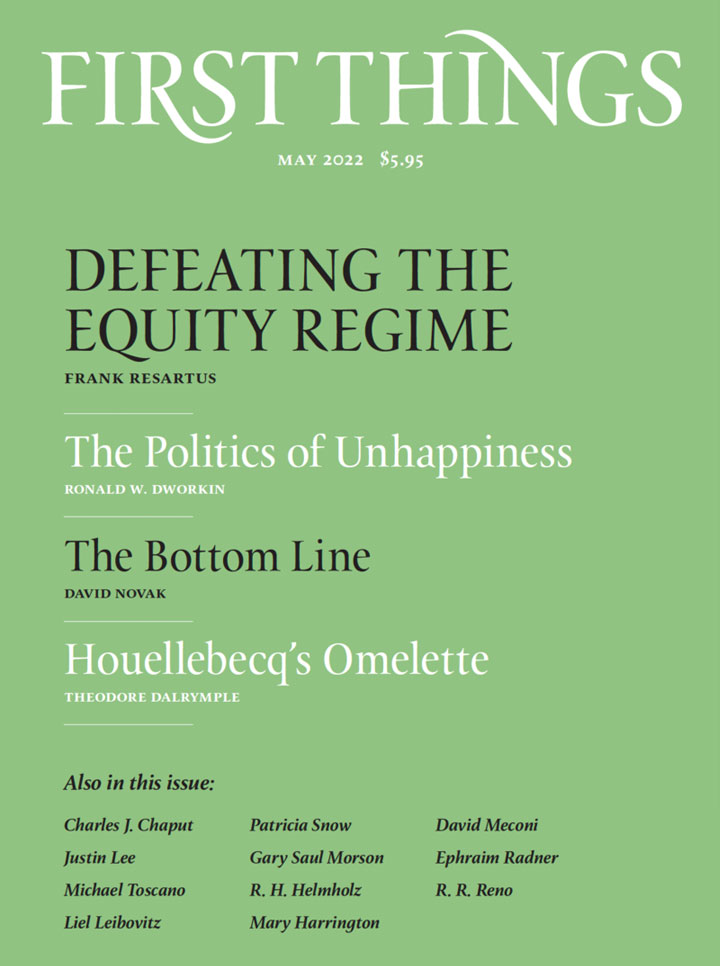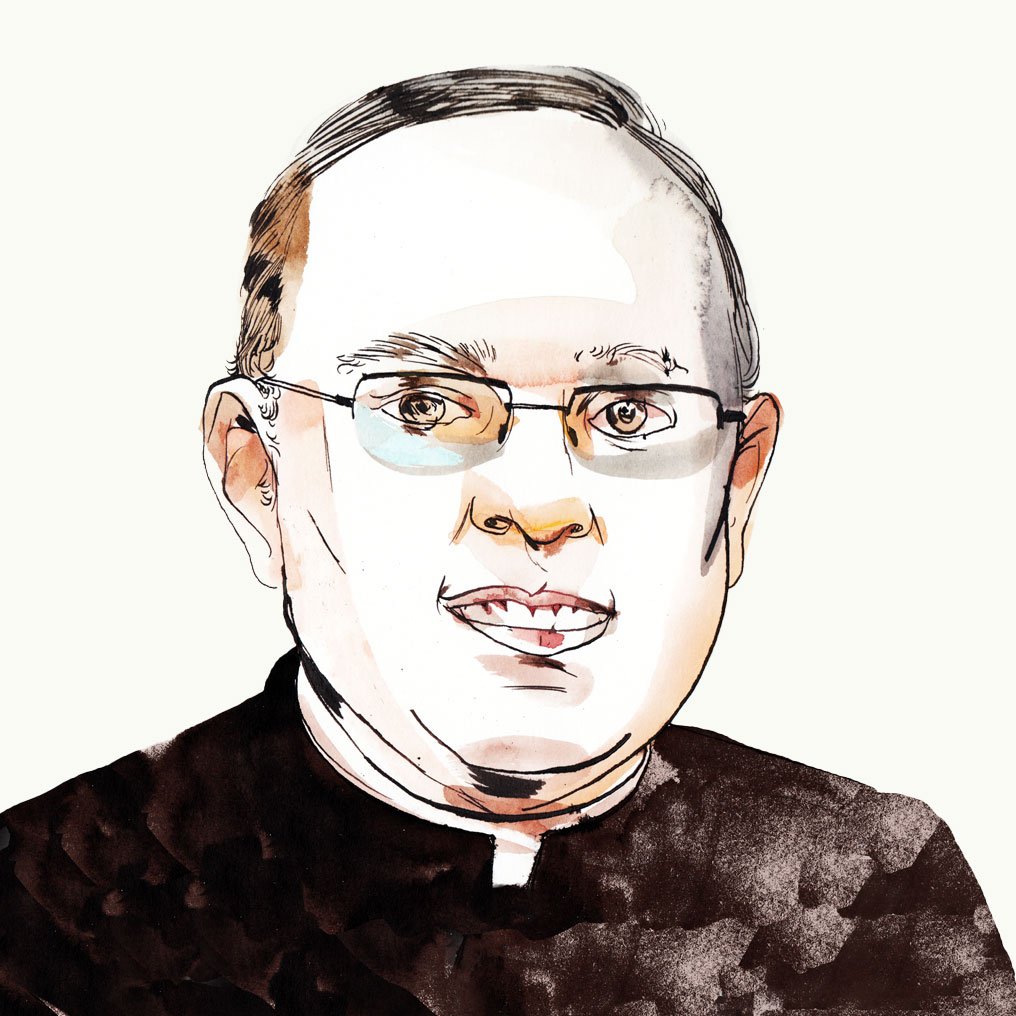Contempt for religious faith has been growing in America’s leadership classes for many decades, as scholars such as Christian Smith and Christopher Lasch have shown. But in recent years, government pressure on religious entities has increased. It involves interfering with the conscience rights of medical providers, private employers, and individual citizens. It includes attacks on the policies, hiring practices, and tax statuses of religious charities, hospitals, and other ministries. These attacks will get worse as America’s religious character weakens.
This is happening at a time when our political leaders offer a curious mix of arrogance and vindictiveness at home, and incompetence abroad. As a nation, we’ve turned abortion into a sacred right. We’ve lost control of our southern border. We’re obsessed with pronouns and confused sexuality. Parents are identified as domestic terrorists. Self-described Catholic public leaders act with astonishing hypocrisy. Meanwhile, Russia and China—as we’ve seen in Ukraine and Hong Kong, and may soon see in Taiwan—perceive us as weak, distracted, and bumbling. If I overstate these problems, it’s not by much. We increasingly seem to be a hegemon in decline, and other countries can sense it.
What does all this mean for us as Christians and citizens?
Our traditional political system presumes a civil society that pre-exists and stands outside the full control of the state. In the American model, the state is (or was) meant to be modest in scope and constrained by checks and balances. Mediating institutions, such as the family, churches, and fraternal organizations, feed the life of the civic community. They stand between the individual and the state. And when they recede, the state fills the vacuum. Protecting these mediating institutions is therefore vital to our political freedom. The state rarely fears individuals, because individuals can be isolated or ignored. Organized communities are a different matter. They can resist. And they can’t be ignored.
This is why, if one wants to revise the American story into a different kind of social experiment, a problem like the Catholic Church can be so annoying. She’s a very big community. She has strong beliefs. And she has an authority structure that’s hard to break—the kind that seems to survive every prejudice and persecution, even the mediocrity and worst sins of her own leaders.
As Christians, most of us have a deep love for our country. But America is not our final home. There is no automatic harmony between Christian faith and American democracy. For all its strengths, democracy has the potential for its own peculiar and very powerful kind of tyranny. In the words of the political philosopher Robert Kraynak, democracy advances “the forces of mass culture, which lower the tone of society . . . by lowering the aims of life from classical beauty, heroic virtues and otherworldly transcendence to the pursuits of work, material consumption and entertainment.” Human life is reduced “to a one-dimensional materialism and [an] animal existence that undermines human dignity and eventually leads to the ‘abolition of man.’”
To put it another way: The right to pursue one’s happiness does not include a right to excuse or ignore evil in ourselves or anyone else. When we divorce our politics from a grounding in virtue and truth, we transform our country from a living moral organism into a golem of legal machinery without a soul.
Happiness, real happiness, is tied to wisdom, and wisdom grows out of risk and suffering, the beauty and hard edges of experiencing the real world. It’s never the result of commerce. We can’t “own” happiness. And it is never solitary. Happiness requires other people. The joy of a young mother is linked to the gift of life she makes to a new and unrepeatable soul in the act of birth—to the pain and effort she experiences in bearing her child. Happiness is either created and shared with others here and now, or remembered as moments shared with others in the past. This is why, even as he was beaten and starved in a Nazi death camp, the Holocaust survivor Viktor Frankl could know happiness and the interior freedom it brings when he remembered the love of his wife.
“Comfort” is a different thing. In its historic sense, this word—its Latin root is fortis—denotes fortification or strengthening, perhaps for spiritual action, perhaps through the ministrations of the Comforter, the Paraclete. The modern meaning is more debased: something producing physical ease. In our consumerist age, “comfort” is the emollient we place between ourselves and the facts of everyday life. It’s our insulation, our analgesic. The world can be a nasty and unforgiving place. Nobody wants to be cold in the winter when he can be warm, or hungry when he can eat steak. Comfort, in this sense, isn’t a bad thing in its place. But it becomes “happiness” in only one circumstance: when we provide it to another person; when we ease someone else’s suffering or burden.
America in 2022 has become a consumer culture that runs on the marketing, sale, purchase, and consumption of comfort. We like and want comfort because we are creatures with bodies that experience pleasure and pain. But we long for happiness. And deep down we all know which is which, and which is more important. We were made for something more than anesthesia. This is why a culture of pleasure and indulgence, a culture focused mainly on the pursuit of material well-being, is never really a culture of joy. Comfort is about the self, about making things easier or escaping inconvenience. And when it’s the main course of a life and a civilization, it first dulls the appetite for happiness and then replaces it altogether.
A consumer culture diminishes hardship, but it also lowers our horizons to the here and now. Comfort is a costly habit to feed and a demanding habit to maintain. As Coco Chanel liked to say, the best things in life are free; the second-best things are very, very expensive. The greater a man’s need for comfort, the more he has to lose, the greater his fear of losing it, and the more firmly bound he is to this world and its uncertainties.
A culture committed to, and organized around, the pursuit of comfort can never really value nobility, honor, courage, or magnanimity—the qualities that distinguish us as human—because these things demand self-denial, and risk, and a belief in something or Someone greater than ourselves. Comfort lived as a guiding appetite produces mediocrity. It sedates the soul. The result is a resentment of any higher purpose in life as an unwanted distraction—or worse, a hostile intrusion. It’s useful to compare this kind of spiritual enfeeblement with the aggressive ambition and relentless work ethic of large segments of China’s defense, software, and other key industries. Work begins early and ends late. And this regimen, ultimately accountable to the Party, serves a higher purpose: the power and prestige of the nation. The words “weakness” and “decline” are absent from the contemporary Chinese vocabulary.
Worship of the self and its comforts, and worship of the state and its prestige, are both forms of idolatry. But it doesn’t take a genius to know which form of worship is more compelling and more powerful.
What shall we do about our situation? The way to create new life in any culture is to live our lives according to convictions that are greater than ourselves and shared with people we know and love. This path is very simple and very hard at the same time. It is the only way to make a revolution that matters.
When young people ask me how they can change the world, I tell them to love each other, get married, stay faithful to one another, have lots of children, and raise those children to be men and women of Christian character. Faith is a seed. It doesn’t flower overnight. It takes time and love and effort. Money is important, but never the most important thing. The future belongs to people with children, not with things. Things rust and break, but every child is a universe of possibility that reaches into eternity, connecting our memories and our hopes in a sign of God’s love across the generations.
To see the face of Europe in a hundred years, look to the faces of young Muslim immigrants. Islam has a future because Islam believes in children. Without a transcendent faith that makes life worth living, there’s no reason to bear children. And where there are no children, there is no imagination, no reason to sacrifice, and no future. At least six of Europe’s most recent and prominent national leaders had no children at all. It’s hard to avoid a sense that much of Europe is already dead or dying, and nothing prevents us from doing the same.
The America we now see emerging—an America ignorant or cynical toward religion in general and Christianity in particular—shouldn’t really surprise anyone. It’s a new America, made in America. Christians—including Catholics—helped create it with our eagerness to fit in, our distractions, and our lukewarm faith.
Too many people who claim to be Christian simply don’t know Jesus Christ. They don’t really believe in the gospel. They feel embarrassed by their religion and out of step with the times. They may keep their religion for its comfort value, or adjust it to fit their doubts. It doesn’t reshape their lives, because it isn’t real. And because it isn’t real, it has no transforming effect on their behavior, no social force, and few public consequences. Their faith, whatever it once was, is now dead.
We make history, not the other way around. We are not victims, or the helpless creatures of inevitable historical forces. Nothing is inevitable except the victory of Jesus Christ—and that includes what history finally says about the character of the nation we call America.
If we do not know and love Jesus Christ, and commit our lives to him, and act on what we claim to believe, everything else is empty. But if we do, so much is possible—including the conversion of at least some of the world around us. The only question that finally matters is the one Jesus posed to his apostles: “Who do you say I am?” Faith leads in one direction; the lack of it in another. But the issue is always faith—always and everywhere, whether we’re scholars or doctors or clergy or lawyers or mechanics. Do we really believe in Jesus Christ, or don’t we? And if we do, what are we going to do about it?
The vocation of a Christian disciple is to feed the soul as well as the mind; to offer the world a vision of men and women made whole by the love of God, the knowledge of creation, and the reality of things unseen; to see the beauty of the world in the light of eternity; to recapture the nobility of the human story, and the dignity of the human person.
This is the work that sets fire to the human heart. It starts the only kind of revolution that really changes anything: a revolution of love. Jesus said, I came to cast fire upon the earth, and would that it were already kindled. Our task is to kindle that blaze, and then use all our strength to help it grow.
This text is adapted from his Benedictine Leadership Institute Award remarks at Belmont Abbey College.
The Battle of Minneapolis
The Battle of Minneapolis is the latest flashpoint in our ongoing regime-level political conflict. It pits not…
Of Roots and Adventures
I have lived in Ohio, Michigan, Georgia (twice), Pennsylvania, Alabama (also twice), England, and Idaho. I left…
Our Most Popular Articles of 2025
It’s been a big year for First Things. Our website was completely redesigned, and stories like the…



